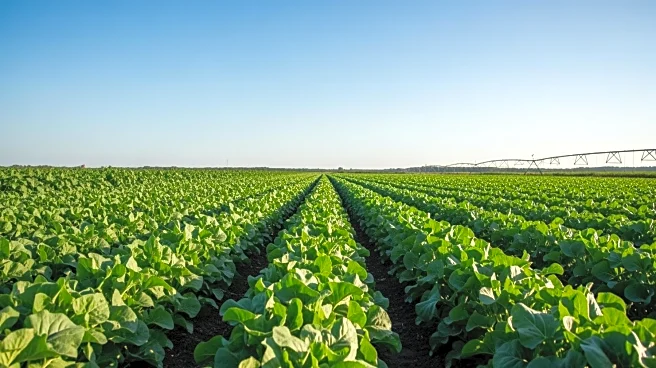What's Happening?
The African Development Bank Group has received a $14 million allocation from the Global Agriculture and Food Security Program (GAFSP) under its new private sector financing window. This funding aims to unlock
$200 million from the private sector to enhance food security in low-income countries. The initiative includes the establishment of the Agro-Inputs Risk Sharing Facility, which will provide guarantees to financial institutions to encourage lending to smallholder farmers and agribusinesses. The facility is expected to benefit over 1.5 million smallholder farmers and 500 agro-dealers and cooperatives by expanding access to certified seeds, organic fertilizers, and other agricultural inputs.
Why It's Important?
This funding is crucial for addressing the challenges faced by smallholder farmers and agribusinesses in fragile and low-income countries, who often struggle to access credit and investment due to perceived high risks. By providing de-risking capital and technical assistance, the initiative aims to catalyze private sector lending, thereby strengthening the agricultural value chain and enhancing food security. The program's focus on resilience to climate change impacts, such as extreme weather conditions, is particularly significant as it supports sustainable agricultural practices and helps build robust food systems.
What's Next?
The Agro-Inputs Risk Sharing Facility will be implemented by the African Trade & Investment Development Insurance, which will provide political risk and credit insurance to investors. This move is expected to incentivize local banks to extend credit to agro-input suppliers, thereby facilitating greater investment in the agricultural sector. As the facility rolls out, stakeholders will likely monitor its impact on food security and the ability of smallholder farmers to withstand market shocks and environmental pressures.
Beyond the Headlines
The initiative represents a shift towards leveraging private sector financing to address food security challenges, highlighting the importance of collaboration between donor funds, multilateral development banks, and commercial finance. This approach not only addresses immediate needs but also fosters long-term resilience and sustainability in the agricultural sector, potentially serving as a model for similar initiatives in other regions.










